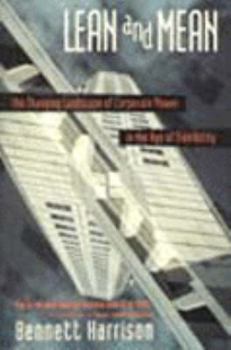Lean and Mean: The Changing Landscap of Corporate Power in the Age of Flexibility
The author argues that far from being overtaken by nimble and innovative small businesses, the giant corporations are still the engines of the global economy. This description may be from another edition of this product.
Format:Paperback
Language:English
ISBN:0465038859
ISBN13:9780465038855
Release Date:April 1995
Publisher:Basic Books
Length:336 Pages
Weight:1.15 lbs.
Dimensions:1.0" x 6.1" x 9.2"
Customer Reviews
2 ratings
excellent
Published by Thriftbooks.com User , 23 years ago
i read this book for an economic development class and it was a surprisingly good complement to many books i've read recently: regional advantage (saxenian), technopoles of the world (castells/hall) and the capitalist imperative (storper). surprising, because i hadn't heard of harrison before. he rejects the idea that creativity and economic growth in a network economy come from small firms and does so with numerous examples, from silicon valley to italy. he argues that only large firms have the wherewithal to invest in the r & d necessary in the new economy, and that these large entities also set the standards for the numerous small firms to follow. to wit, jeff bezos found a way to leverage the browser that marc andreessen created, but both these individuals needed the idea that the u.s. defense industry and darpa created. harrison takes a macro view, and if i have a criticism of his thesis, it is just that - by looking at creativity from such a high level he seems to dismiss the fact that teams like tom west's eagle group are the exception at bureaucratic big firms. harrison probably takes the view he does because his ultimate goal is to chasten big firms, whose new economy style gave rise to the book's title. a former professor at new york's liberal new school (harrison died recently of throat cancer), harrison is a voice for social and labor justice, advocating for workers who are being exploited (still) even as capitalism changes form.
Bennett Harrison and Fred Block
Published by Thriftbooks.com User , 26 years ago
Introduction World economics, like the ecology of natural ecosystems, is a dynamic system that evolves as technological advances change modes of production and consumption. New industries and the way they operate in a global context have a cause/effect relationship on the economic and societal frameworks, which are constructed as a result. Upon reflection of modern society, we can break human development into three phases of development. First and foremost was the agricultural society in which agriculture was the main commodity produced. As the scientific revolution of the 18th Century developed new ways of understanding the natural world, it gave rise to new inventions in the 19th Century, such as the steam engine, steel, and the development of new raw materials. This era, up through the mid-20th Century became known as the industrial society. During the era of the industrial society, agriculture dropped from constituting 60% to 6.9% of the economy as manufacturing replaced agricultural production (Block, p. 60). As technology improved and created new products, modes of production once again changed. This era, which focuses more on services and information flow rather than production, continues into the present, and has been termed the "post-industrial society". (Post-industrial is a term that will frequently be used throughout this essay. A small section, after the historical context section, has been devoted to provide a clear definition of "post-industrial"). In Bennett Harrison's book, Lean and Mean: The Changing Landscape of Corporate Power in the Age of Flexibility, Harrison takes a progressive approach to analyzing the way in which big and small businesses operate in a new global market economy within this new post-industrial construct. Harrison argues that contrary to popular belief, big businesses are not on their way out. They are still alive and well, becoming more flexible and efficient, and still remain, as the economic drivers of our economy. Throug! h case studies and empirical research from the U.S., Japan, and Europe, he shows how powerful multi-national corporations (MNC's) have reorganized themselves externally and internally, becoming "lean and mean". To help defend his argument about big business, Harrison also defines the role of small business in today's society. Throughout this essay, the term large and small firm is frequently used. A large firm is defined as an institution employing 100 or more employees. A small firm is defined as an institution employing less than 100 employees. Fred Block, like Harrison, takes a progressive approach to critiquing post-industrialism in his book Postindustrial Possibilities: A Critique of Economic Discourse. Unlike Harrison, Block focuses more on restructuring neoclassical economic thought to make it more democratic in this new era of information. Block's three goals to understanding post-industrialism are to critique postindustrial theory, use economic sociology as






